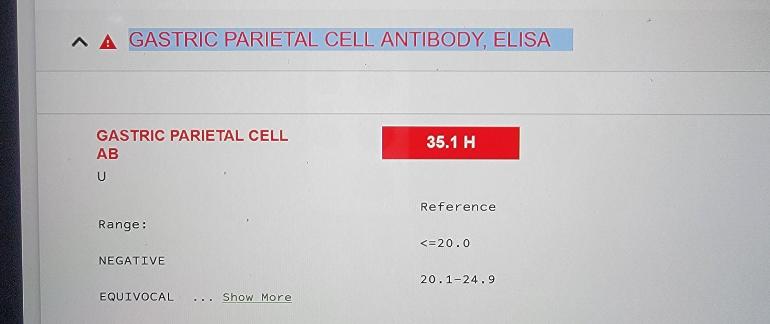Parietal Cell Antibody, ELISA/ positive
Parietal Cell Antibody with Relex to Titer/ Negative

Parietal Cell Antibody, ELISA/ positive
Parietal Cell Antibody with Relex to Titer/ Negative
Interesting ! Thank you for sharing.
The ELISA test gives a result that is Positive, Weakly positive or Negative.
southtees.nhs.uk/services/p...
But if they want to know more, I suspect they have to use a different technology to actually measure them. Hence, this test would have reflexed to doing a titre because the ELISA was at least weakly positive (might have to be absolutely positive - I don't know).
Though the effect of knowing the titre would have on any treatment is another question.
I suspect an ELISA test is less expensive than the full titre test. Hence, only do titre if the ELISA indicates it might be sensible.
Scientist, not medic. Here we go; dull lab stuff, please ignore it if you wish. We use titres to measure the 'strength' of antibodies in lots of different tests; a degree of 'bucket chemistry' comes in to this.
Performing a titre involves serial dilution of the serum being tested. Double-diluting would involve creating a range of dilutions: 1+1 [1 in 2, 50%]; 1+3 [1 in 4, 25%] and so on. It is likely that the Elisa test is a commercial one, probably being performed on a 96 well plate. Performing the test would require several of the 96 wells to be used for controls and calibrators, so you don't get 96 tests per plate. If you calculate the cost per test as being how many you get out of one plate, then a titre will increase the cost per patient sample depending on how many stepwise dilutions are performed, and then there's the cost in time and materials in performing the dlutions. So a titre could easily cost 5 times as much, or more, than a simple single test.
Is there any benefit to knowing a reasonably accurate titre rather than just "positive"?
I'm used to the claim that antibody numbers really don't mean anything much - after all, the treatment is the same. (Esp. in relation to thyroid peroxidase and thyroglobulin antibodies.)
To be honest, no, not in my book anyway. Positive is positive, negative is negative. Equivocal? Rather than paying for sample titration, a repeat in a few months should tell everything needed. Equivocal could be 'false', whereas if it's going somewhere, it should become clearer. I hope this helps.
Of course, if I was selling the tests and each well in the plate brought me a few more pounds, my answer might be different!
😴... just yanking your chain! You are so valuable, FlipperTD!
Thanks. These two tests are quite a few years apart. I had that first positive test in 2015. Then in 2022 the new GI doctor didn't trust the old test so did another one with the Titer. Came back negative and I couldn't get my b12 up until recently.
In my opinion, the first test was correct. ['often in error, but never in doubt' describes me.] As for 'not trusting' the old test, well, that's the doctor's prerogative, and it's always my advice that if you don't believe something, then repeat it and see if you get the same answer. If it's different, then repeat it again, and so on; it keeps us busy!
Antibody titres rise and fall, for no single particular reason. If for example you get bitten by a horse-fly, then that can trigger a general immune response, so there's every possibility that your titre would have risen at that point. If you get a Covid vaccine, that triggers an immune response; antibody titres rise, and then fall over time. Doesn't mean to say that you weren't immune earlier.
That makes perfect sense to me. Thanks so much. I was able to get back my b12 injections recently after my b12 started falling. I'm one of those types that needs to have a complete understanding standing of things to fully grasp it. Because I said so has never been an adequate reason lol. Thanks again.